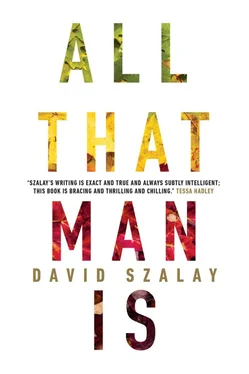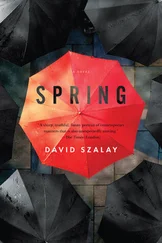Still, his sleep is poor. He feels stretched thin with fatigue, feels as insubstantial sometimes as the sails of smoke that sag in the windless air of the warm living room. Sometimes he feels transparent, at other times insufferably solid, but all the time there is the small furtive thrill of inhabiting the same space as her. Of using, for instance, the same bathroom. The small, water-stained bathroom is full of her stuff. He examines it with intense interest.
If her proximity thrills him, however, it tortures him as well in the long pallid hours of each afternoon, as he lies on the sofa knowing that she is there, on the other side of the flimsy wall, at which he stares as if trying to see through it, while the fantasies unspool in his smooth skull.
As for her, he marvels at how fresh she seems. If on Monday, which was the fourth day, she looked a little haggard and hungover when she appeared at four o’clock in the afternoon in her old towelling dressing gown, it was nothing she was not able to magic away with twenty minutes in front of the bathroom mirror.
Monday was the night they had the problem, the night of the incident. It was still early, not even eleven, when Gábor got the text. ‘Shit,’ he said.
‘What is it?’
‘It’s from Emma.’
‘What’s it say?’ Balázs asked.
‘Nothing.’
‘Isn’t that the signal?’
‘Maybe it’s a mistake,’ Gábor said.
‘Isn’t it the signal?’ Balázs asked again.
‘Yeah,’ Gábor sighed. ‘Okay,’ he said heavily, ‘let’s go.’ He was scared, Balázs thought. That’s why he was taking the hammer — he had a hammer with him, he kept it under the driver’s seat. Now it was up his sleeve.
They started to walk towards the hotel. Gábor was shaking his head, his face full of sorrowful intensity and fear. As they walked, he phoned Juli, who was working nights all week. She said she would meet them at the staff entrance.
She was waiting there, smoking nervously, when they arrived.
They followed her along a passageway with a green plastic floor, to the service stairs. ‘It’s the fourth floor,’ she told them, handing Gábor the key card. Gábor nodded, and he and Balázs started solemnly up the stairs.
Scuffed walls, a neon tube over each landing.
‘You ready?’ Gábor asked.
Balázs shrugged.
Gábor said, ‘This is where you earn your money.’
‘Okay.’
‘I’ll make sure she’s okay, you deal with him. I mean, if there’s any trouble.’
‘Okay.’
‘And the minimum of necessary force, yeah? I know I don’t need to tell you that. We don’t want…You know what I mean.’
He was worrying about the police, obviously. It was something that was on Balázs’s mind too. ‘Why don’t you leave the hammer here?’ he said, stopping.
‘What?’
‘Leave the hammer here. You can get it later.’
‘Why?’
Balázs wondered how to put it. ‘Look,’ he said, ‘if…’ He started again. ‘Let’s say the police get involved, and you’ve got a hammer…A weapon . D’you see what I’m saying? We won’t need it anyway.’
Gábor was doubtful. ‘We won’t need it?’
‘No.’
‘Are you sure?’ After a further hesitation, Gábor said, ‘Okay.’ He put the hammer down quietly and they passed through a fire door into the heavy, monied hush of the hallway on the other side. It was unlike anywhere Balázs had ever been, the sort of place he had only seen in American films — that was how it felt, like he was in an American film.
They were standing outside 425, the lacquered woodwork of the door. Listening, they heard nothing. Then Gábor swiped the sensor, the lock whirred and disengaged, and they went in.
‘What’s this?’ Gábor said. He sounded surprised, almost disappointed.
There were three people in the room, which was large and well lit — Emma and two Indian men, all sitting down, and all seemingly waiting patiently, in polite silence.
‘Okay, listen,’ one of the Indians said immediately, standing. ‘We want to talk to you.’ He was much the older of the two of them and had been sitting on an upholstered chair between the tall, draped windows.
Gábor ignored him and said to Emma, in Hungarian, ‘What’s going on?’
She shrugged. ‘There are two of them.’
‘I can see that. What’s been happening?’
‘Nothing.’
The older man was wearing a tweed jacket and seemed to be waiting for Gábor to finish speaking to Emma.
Gábor turned to him and said, in English, ‘Only one of you can be here.’
‘Yes, this is what we want to talk to you about,’ the man said.
‘Only one of you,’ Gábor told him again.
‘I understand, I understand…’
‘Okay, you understand. So one of you go. Please.’
The Indians — the older with his nice jacket and manners, his elegant cologne; the younger, scrawny in a Lacoste polo shirt, and still in his seat — were profoundly unintimidating. There was a fairly obvious sense that Balázs, standing with his arms folded near the door, displacing a lot of air, would be able to deal with them simultaneously if necessary. The older man’s exaggerated politeness, with its weird edge of suppressed hysteria, may just have been an acknowledgement of that.
‘I understand,’ he was saying yet again. ‘The young lady told us that only one of us could, uh…you know,’ he said. ‘I understand. That’s okay. That’s okay. My, uh, my young friend will be…will be doing that.’
Moving only his eyes, Balázs looked at the younger man. He was about twenty perhaps, or even younger, and, slumped in his seat, staring at his loafers, seemed not even to be following what was happening.
Gábor said to Emma, again in Hungarian, ‘Do you have the money?’
She nodded.
‘Who paid you?’
She pointed to the older Indian, who said, ‘I just want to watch.’
Gábor turned to him. ‘You want to watch?’
‘Yes.’
‘ Baszd meg .’
‘Is it a problem?’
‘Yes, it’s a problem,’ Gábor said in a louder voice.
‘Why?’
‘Why? Why? ’ With what seemed to be a sudden loss of temper, Gábor seized the man by the scruff of his jacket and first swung and then started shoving him towards the door, until Balázs, packed into his lurid turquoise shirt, intervened and separated them.
There was a moment of tense quiet while Gábor, evidently struggling to maintain a professional demeanour, focused on his shoes.
Then he looked up and said, tautly, ‘It’s a problem, okay. A problem. Please?’ With stiff politeness, an extended hand, he showed the man the door.
The Indian was starting to sweat somewhat. Nevertheless he seemed determined to negotiate it out. Panting slightly, he said, ‘No, just a minute. Please. I also say please. Just a minute.’
‘Let’s go,’ Gábor said.
‘Please,’ the man went on. ‘Let’s just talk for a minute. Let’s just talk. Your friend said the money was for a whole night with the, the young lady. Your friend said that.’
‘Yes,’ Gábor said, with strained patience.
‘Now, listen,’ the Indian said, his pate starting to shine, ‘what I want to suggest is, uh, that we only take an hour or two of her time — but that I’m allowed to watch. Just watch! Is that fair? Doesn’t that seem fair?’
‘Look,’ Gábor said. ‘She doesn’t do stuff like that, okay? She’s a nice girl.’
‘Oh, she’s a nice girl — of course she’s a nice girl…’
‘Yeah, she’s a nice girl. Let’s go.’
‘Okay, you want more money,’ the Indian said, as if surrendering, as Gábor took hold of his arm. ‘How much? How much? A thousand pounds,’ he offered.
Читать дальше












